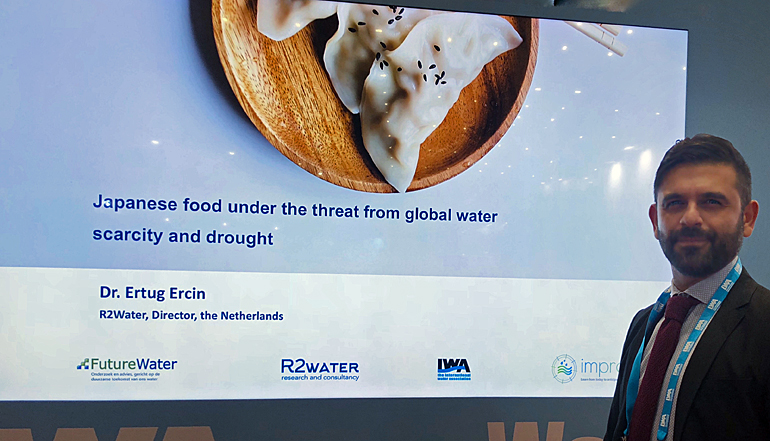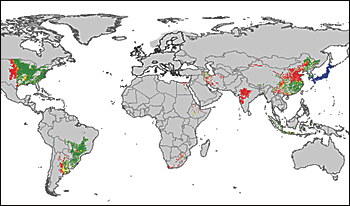IWA World Congress 2018: Global water crises may affect Japan's food imports
 Disrupted rain patterns and increasing groundwater depletion in other countries, can seriously affect the import of food by Japan. And this can result in higher Japanese food prices.
Disrupted rain patterns and increasing groundwater depletion in other countries, can seriously affect the import of food by Japan. And this can result in higher Japanese food prices.
This was the warning by Ertug Ercin, director of Dutch-based consultancy firm R2Water at the World Water Congress of the International Water Association in Tokyo, Japan on 17 September.
Ercin presented his findings on the Japanese water footprint at a press conference. Ercin is involved in the EU-project Improving Predictions and management of hydrological extremes (Imprex) together with Dutch consultancy firm FutureWater.
 Japan imports 92 percent of its soybeans of which 80 percent is vulnerable to water scarcity. In red the highly vulnerable areas, in green the low vulnerable areas. (source: R2 Water 2018).
Japan imports 92 percent of its soybeans of which 80 percent is vulnerable to water scarcity. In red the highly vulnerable areas, in green the low vulnerable areas. (source: R2 Water 2018).
All connected
‘We are all connected and whatever we do, we are responsible for the water use at the other end of the world. What happens there in relation to the water use, will affect us. It will affect the food on our table’, Ercin said.
Research by Ercin on global water economics, shows that Japan is highly dependable on soybeans and maize products from USA, India, China and Brazil.
For its coffee and palm oil it depends on the imported from Malaysia and Indonesia.
Increasing meat and dairy consumption
This dependency will increase as diet in Japan shifts towards more meat and dairy consumption, particularly in urban areas. Japan will gradually import more of these products, but will also expand its own meat and dairy sectors.
Ercin found that around 80 percent of global soybean supply is highly vulnerable to water scarcity in producing regions.
Therefore, he warned, water scarcity and drought can affect the food production and result in severe fluctuations in the price of meat and dairy products in Japan.
This news item is based on a press release published on the websites of Future Water and Imprex.
Read also on this website
● IWA World Congress 2018: Bronze award for energy recovery project by Waternet Amsterdam, 18 September 2018
● New launched version of Water Footprint Assessment Tool provides easier access to data on global water use, 25 July 2014
More information
R2 Water
Wageningen, the Netherlands
ercin@r2water.nl
+31 6 173 66 472
Future Water
Wageningen, the Netherlands
+31 317 460 050
www.futurewater.eu
Water Footprint Network
Enschede, the Netherlands
+31 53 489 4320
www.waterfootprint.org/en
Imprex
www.imprex.eu
Ertug Ercin explains how water scarcity in China, Argentina and USA can affect Japan´s cuisine.



